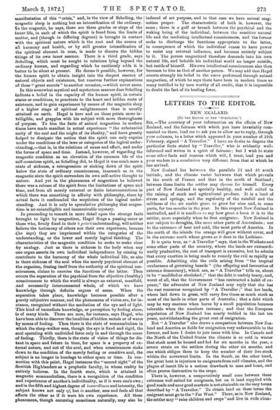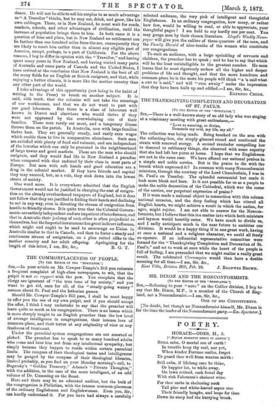LETTERS TO THE EDITOR.
NEW ZEALAND.
[TO THE EDITOR. OF THE 'SPECTATOR.')
Sin,—The accuracy of your information on the affairs of New Zealand, and the fairness with which you have invariably com- mented on them, lead me to ask you to allow me to reply, through your columns, to a letter which appeared in your number of 24th February, signed "A Traveller." I have no desire to dispute the particular facts stated by "Traveller," who is evidently well- informed and writes in a spirit of fairness ; but I wish to state some other facts and reasons which will, I trust, lead you and your readers to a conclusion very different from that at which he has arrived.
New Zealand lies between the parallels 34 and 48 south latitude, and the climate varies between that which prevails in the south of France and that in the south of Scotland ; between these limits the settler may choose for himself. Every part of New Zealand is specially healthy, and well suited to the raising of stock and agricultural produce. It is a land of rivers and springs, and the regularity of the rainfall and the mildness of the air enable grass to grow for nine and, in some parts, for ten months in the year. In this respect New Zealand is unrivalled, and it is needless to say how great a boon it is to the settler, more especially when he first emigrates. New Zealand is not subject to droughts, like most other parts of Australasia ; nor to the extremes of heat and cold, like most parts of America. In the north of the islands the orange will grow without cover, and in the extreme south wheat grows as it does in the Lothians.
It is quite true, as "A Traveller" says, that in the Waikato and some other parts of the country, where the lands are extraordi- narily productive, the cost of transport is excessive, but he admits that every exertion is being made to remedy the evil as rapidly as possible. Admitting also the evils arising from "the tropical exuberance of governing boards" (the offspring and favourites of extreme democracy), which are, as "A Traveller" tells us, about to be "modified or abolished ;" that the debt is unduly heavy, and, worst of all, that the Government "has contracted a habit of ex- pense," the advocates of New Zealand may reply that she has the vast resources recognized by "A Traveller ;" that her lands, where laid down in grass, will carry five times as much stock as most of the lands in other parts of Australia ; that a debt which may be very onerous when borne by a small population becomes tolerable when the numbers increase ; and that the European population of New Zealand has nearly trebled in the last ten years, notwithstanding the great cost of emigration.
But "A Traveller" also draws a comparison between New Zea- land and America as fields for emigration very unfavourable to the former, and here I desire to join issue with him. In Canada and the North of the United States the climate is so cold in winter that stock must be housed and fed for six months in the year, a severe strain on the settlers during the other six months, and one which obliges them to keep the number of their live stock within the narrowest limits. In the South, on the other hand, the great heat is injurious to emigrants from cold climates, and the plague of insect life is a serious drawback to man and beast, and often proves destructive to the crops.
There is, however, a comparatively small zone between these extremes well suited for emigrants, but on it land supplied with good roads and near good markets is not attainable on the easy terms described by "A Traveller." To obtain land on these terms the emigrant must go to the "Far West." There, as in New Zealand, the settler may "raise children and crops " and live in rude abun- dance. He will not be able to sell his surplus to as much advantage ' selected audience, the very pick of intelligent and thoughtfu/ as" A Traveller "thinks, but he may eat, drink, and grow, like his Englishmen. In an ordinary congregation, how many, or rather- own cabbages. There, as in New Zealand, he must wait for roads, how few, would be willing to read, or able to appreciate, your markets, schools, and other advantages of civilization, until the thoughtful pages ? I am bold to say hardly one per cent. Yon increase of population brings them to him. In both cases it is a may gauge men by their chosen literature. Lloyd's Weekly News- question of time and place, but in New Zealand no settlement can paper will give you the calibre of three-quarters of the men, and be farther than one hundred miles from the sea, consequently they the Family Herald of nine-tenths of the women who constitute- are likely to reach him earlier than in almost any eligible part of our congregations.
America, except, perhaps, in a part of California. For the above To such an audience, with a large sprinkling of servants and reasons, I beg to differ in opinion with the "Traveller," and having children, the preacher has to speak ; and he has to say that which spent many years in New Zealand, and having visited many parts will be the least unintelligible to the greatest number. He soon• of Australia and some parts of Canada and the United States, I learns that he must rigorously eschew all the higher and deeper have arrived at the conclusion that New Zealand is the best of all problems of life and thought, and that the more humdrum and the many fields for an English or Scotch emigrant, and that, while common-place he is the more his people will think "a 'a said what- enjoying a better climate, it is more like the mother country than a owt to 'a said," and will "cum awaiiy " under the impression
any other part of the world. that they have been built up and edified.—I am, Sir, &c., One word more. It is everywhere admitted that the English Government would not be justified in charging the cost of emigra- tion on the already overburdened taxpayers of England, but it does not follow that they are justified in folding their hands and declining to act in any way, even in directing the stream of emigration from hostile to friendly shores. It is quite true that the Colonial Govern- ments are entirely independent and are impatient of interference, and that in Australia their jealousy of each other is often prejudicial to themselves, but the Imperial Government has great indirect influence, which might and ought to be used to encourage an Union in Australia similar to that in Canada, and then to foster a steady and continuous stream of emigration, on a plan suited alike to the mother country and her adult offspring. Apologizing for the



































 Previous page
Previous page